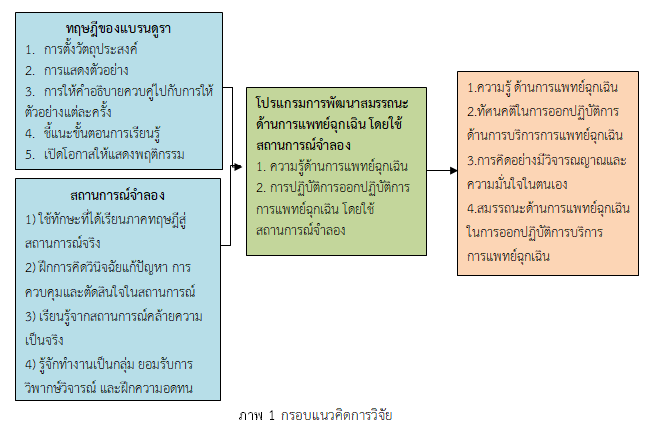ผลของโปรแกรมการพัฒนาสมรรถนะด้านการแพทย์ฉุกเฉิน โดยใช้สถานการณ์จำลอง ในการออกปฏิบัติการการแพทย์ฉุกเฉิน กรณีผู้ป่วยที่มีประวัติเข้าเกณฑ์สงสัยการติดเชื้อ Covid 19 ของชุดปฏิบัติการระดับพื้นฐาน จังหวัดมหาสารคาม
คำสำคัญ:
Performance Emergency medicince Simulation Emergency medical operation COVID19บทคัดย่อ
การวิจัยกึ่งทดลองแบบสองกลุ่มทดสอบก่อนหลังนี้เพื่อศึกษาผลของโปรแกรมการพัฒนาสมรรถนะด้านการแพทย์ฉุกเฉินโดยใช้สถานการณ์จำลองในการออกปฏิบัติการการแพทย์ฉุกเฉิน 19 กรณีผู้ป่วยที่มีประวัติเข้าเกณฑ์สงสัยการติดเชื้อ Covid ของชุดปฏิบัติการระดับพื้นฐาน จังหวัดมหาสารคาม จำนวน 112 คน ประกอบด้วย เจ้าพนักงานฉุกเฉินการแพทย์ อาสาสมัครฉุกเฉินการแพทย์ ใช้การสุ่มตัวอย่างแบบเจาะจงตามเกณฑ์การคัดเลือก แบ่งเป็นกลุ่มทดลอง 56 คน และกลุ่มเปรียบเทียบ 56 คน การใช้โปรแกรมในผู้ป่วยที่มีประวัติสงสัยว่าติดเชื้อ Covid 19 เป็นกลุ่มทดลองในขณะที่กลุ่มเปรียบเทียบไม่ได้รับโปรแกรม โดยประเมินความรู้ ทัศนคติ การคิดอย่างมีวิจารณญาณและความมั่นใจในตนเอง และสมรรถนะด้านการแพทย์ฉุกเฉิน ผลการวิจัยพบว่า
1. ความรู้ด้านการแพทย์ฉุกเฉินในการออกปฏิบัติการ การคิดอย่างมีวิจารณญาณและความมั่นใจในตนเอง และทัศนคติในการออกปฏิบัติการด้านการบริการการแพทย์ฉุกเฉิน หลังการใช้โปรแกรมสูงกว่า ก่อนการใช้โปรแกรม อย่างมีนัยสำคัญทางสถิติระดับ .001
2. สมรรถนะด้านการแพทย์ฉุกเฉินในการออกปฏิบัติการด้านการบริการการแพทย์ฉุกเฉินกรณีผู้ป่วยที่มีประวัติเข้าเกณฑ์สงสัยการติดเชื้อ Covid ของชุดปฏิบัติการระดับพื้นฐาน ในกลุ่มที่ได้รับโปรแกรมสูงกว่ากลุ่มที่ไม่ได้รับโปรแกรม อย่างมีนัยสำคัญทางสถิติที่ระดับ .001
ผลของการศึกษานี้แสดงให้เห็นว่าควรนำโปรแกรมการพัฒนาสมรรถนะด้านการแพทย์ฉุกเฉิน โดยใช้สถานการณ์จำลองในการออกปฏิบัติการการแพทย์ฉุกเฉิน มาเป็นแนวทางในการอบรมภาคปฏิบัติ และสามารถประยุกต์ใช้ในสถานการณ์อื่นๆ เพื่อเพิ่มความมั่นใจ เพิ่มขีดความสามารถในการปฏิบัติงาน ส่งผลต่อการดูแลผู้เจ็บป่วยได้อย่างมีประสิทธิภาพ
เอกสารอ้างอิง
Abelsson, A. (2017). Learning through simulation. Disaster and Emergency Medicine Journal, 2(3), 125-128.
Atchara, K., Aunjai, K., & Tuenjai, P. (2021). Development of the assessment form emergency medical practice skills of diploma program students medical emergency operations. Journal of Mahasarakham Hospital, 18(3), 139-152. (in Thai)
Awae, H., Khupantavee, N., & Damkliang, J. (2020). Self-efficacy on the ability to care for the injured at the scene of the accident and during the delivery. of medical emergency personnel. Songklanagarind Journal of Nursing, 40(3), 15-25. (in Thai)
Bandura, Albert (2000). Self-Efficacy: The Foundation of Agency1. In Walter, J. Perrig & Alexander Grob (eds.), Control of Human Behavior, Mental Processes, and Consciousness: Essays in Honor of the 60th Birthday of August Flammer. Erlbaum. pp. 16.
Binsalaehman, N., Songwathana, P., & Sornsrivichai, V., (2018). Situation of emergency medical service of local administrative organizations in Southern border provinces and related factors. Narathiwat Rajanagarindra Journal, 10(1), 40-49. (in Thai)
Chompoopan, W., Chanaboon, A., Seedaket, S., & Yomseeken, J. (2020). Heart and blood vessels. Nursing Journal of The Ministry of Public Health, 30(2), 93-103. (in Thai)
Chow, N., Fleming-Dutra, K., Gierke, R., Hall, A., Hughes, M. M. Pilishvili, T., et al. (2020). Preliminary estimates of the prevalence of selected underlying health conditions among patients with coronavirus disease 2019—United States, February 12–March 28, 2020. Morbidity and Mortality Weekly Report, 69(13), 382.
Chubkhuntod, P., Thasanoh Elter, P., Gaewgoontol, N. & Potchana. R. (2020). Effects of simulation based learning model on knowledge, self-efficacy and abilities of applying nursing process skills during intrapartum care of nursing students. Journal of Health Science, 29(6), 1062-1072. (in Thai)
Khunsawai, B., Promarak, T., & Tippayanate, N.(2020). Effects of smart safe program on self efficacy for basic life support of village health volunteers in Community Thadcherngchum Sub-district Muang District Sakon Nakhon Province. UBRU Journal for Public Health Research, 9(2), 69–79.
Lunenburg, F. C. (2011). Self-efficacy in the workplace: Implications for motivation and performance. International Journal of Management, Business, and Administration, 14(1), 1-6.
Mahaprom, T., Chatrung, C., Noparoojjinda, Supawadee Peawnalaw, S., & Doungkeaw, J. (2020). Development of an instructional model based-on simulation-based learning in nursing care of persons with health problems. Multidisciplinary Journal for Health, 1(2), 47-61. (in Thai)
Ministry of Public Health. (2010). Thai Public Health 2011 – 2016. Nonthaburi: Ministry of Public Health. (in Thai)
Naratporn, S. (2012). Development of a Competency Framework for Professional Nurses in the Stroke Semi-Intensive Care Unit. Maharaj Nakorn Chiang Mai Hospital (Independent study, Master of Nursing Science Program in Nursing Administration). Graduate School, Chiang Mai University. (in Thai)
National Institute of Emergency Medicine. (2017). Laws, Announcements, Criteria, Conditions, Criteria and Procedures Relating to Education, Training and Certification of Emergency Operators, Ministry of Public Health Inspection Plan. Fiscal Year 2017. Nonthaburi: National Institute of Emergency Medicine.
Panomwan, B. (2015). Development of competency framework for professional nurses in accident and emergency unit, Lanna Hospital, Chiang Mai Province. (Independent study, Master of Science in Nursing Administration). Graduate School, Chiang Mai University. (in Thai)
Prabket, S. (2021). Simulation and real situation of emergency medicine students at Sirindhorn College of Public Health, Yala Province. Journal of MCU Nakhondhat, 8(6), 238-253. (in Thai)
Sinthuchai, S., Ubolwan, K., & Boonsin, S. (2017). The effect of learning management by a virtual simulation on knowledge, satisfaction, and self-confidence of fourth year nursing students in pre-graduation vocational skill training course. Ramathibodi Nursing Journal, 23(1), 113-127. (in Thai)
Somchit, S. & Kanyarat, U. (2017). Learning by using virtual reality situations: application in teaching and learning management. Journal of the Royal Thai Army Nurses, 18(1), 29-38. (in Thai)
Suphalak, T., (2017). Teaching by simulation in virtual reality in the course of practical principles and techniques of nursing. Journal of Boromarajonani College of Nursing Uttaradit, 9(2), 70-84. (in Thai)
Suwannakeeree, W., Jullmusi, O., Inkaew, T., Tangkawanich, T. & Rueangram. S. (2017). Satisfaction and self-confidence in critical care nursing of nursing students learning with simulation based learning. Journal of Nursing and Health Sciences, 11(3), 167-177. (in Thai)
Uthaisang, T. (2021). COVID-2019: Building morale for medical personnel. MCU Haripunchai Review, 5(2), 94 -107. (in Thai) World Health Organization. (2020). Coronavirus Disease (COVID-19): Weekly Epidemiological Update, 31 August 2020. Retrieved June 20, 2023 from https://www.who.int/home/search-results?indexCatalogue= genericsearchindex1&searchQuery=Coronavirus%20disease%20 (COVID-19)%3A%20weekly%20epidemiological%20update%2C%2031%20August%202020. &wordsMode=AnyWord Zhao, B.,
Kong, F., Aung, M.N., Yuasa, M., & Nam, E. W. (2020). Novel coronavirus (COVID-19) knowledge, precaution practice, and associated depression symptoms among university students in Korea, China, and Japan. International Journal of Environmental Research and Public Health, 17(18), 6671. doi: 10.3390/ijerph17186671

ดาวน์โหลด
เผยแพร่แล้ว
ฉบับ
ประเภทบทความ
สัญญาอนุญาต
ลิขสิทธิ์ (c) 2024 วารสารการพยาบาลและการศึกษา

อนุญาตภายใต้เงื่อนไข Creative Commons Attribution-NonCommercial-NoDerivatives 4.0 International License.





